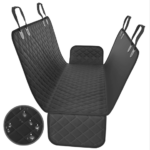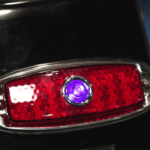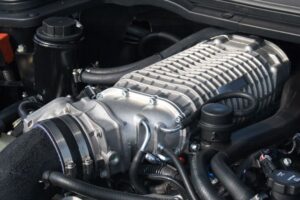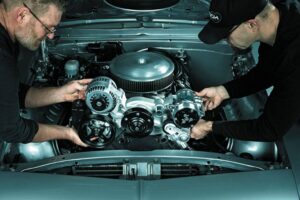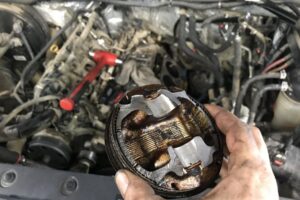Are you wondering whether the age-old practice of revving your car is doing more harm than good? Is there any reason why this practice prevailed for such a long time? Is revving your car bad?
Revving the engine of your car does sound cool. However, you are not doing your engines any favors by doing it. When you rev your car engine for no reason, you are only causing unnecessary wear and tear to its components. It can also lead to wasting gas. Moreover, it tends to release exhaust fumes into the atmosphere.
Read on to learn more about the dangers of revving your car. You will also get a brief background on why this practice started in the first place.
Is Revving Your Car Bad?
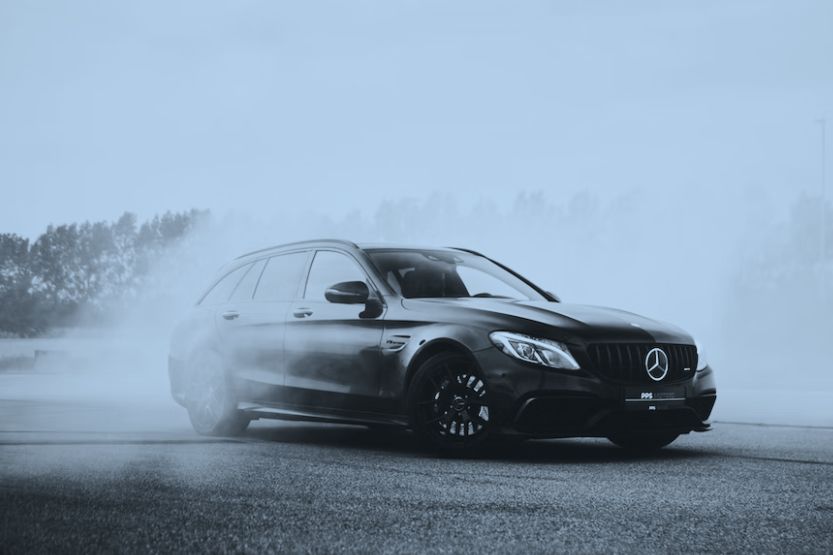
The short answer is yes. Revving a car engine too often is bad. In some instances, it is okay to rev the engine, but those cases are few and far between. There are more reasons why you should not do it first. You will learn about them in the next section of this article.
Dangers of Revving Your Car
What are the possible dangers of revving your car? What makes it so bad for your vehicle? Here are just a few potential dangers to take note of:
1. Damages the Engine Block
If your car’s engine is cold, you may think revving it up will quickly get it to temperature. However, what you do is potentially irreparable damage to the engine block. This is what happens when you work with metal and heat.
It tends to expand when you expose any metal to heat. If you heat a cold piece of metal too quickly, tiny fractures will appear in the metal. The reason is rapid expansion. This is especially true if the engine’s block uses billet aluminum as its main material.
In addition, whenever you start your car’s engine, the oil will sit at the bottom of the engine.
It, therefore, needs a couple of minutes to get to its prime operating temperature and start circulating. If you rev the engine when the oil is still cold and thick, it won’t properly lubricate the moving components.
This is one of the many reasons you should not rev your engine while it is cold. Give it a bit of time to warm up gradually. Spend a couple of minutes idling or a thousand dollars to replace the engine – the choice is yours.
2. Can Potentially Spin a Piston Rod Bearing
This may happen if you rev a cold engine. The engine may fail in several ways when you put a lot of pressure on it before it is ready. One thing that might happen is that you could spin a piston rod bearing.
How does it happen? There should be oil between the piston rod bearing and the crankshaft. This way, if the crankshaft spins, it will not rub against the bearing.
Now, let’s say that you rev the engine before the engine oil gets a chance to circulate. In that case, the bearing would stick to the crankshaft and spin. When that happens, it usually does irreparable damage to the crankshaft.
Even a used, compatible crankshaft will save you at least a thousand bucks. The lesson here is not to rev a cold engine. It is too risky, and fixing your mistake will be pretty expensive.
3. Damages the Turbo
If you are driving a turbocharged car, revving the engine cold may cause excessive damage to the turbine. There are lots of moving parts inside the typical turbocharger. They need lubrication to work.
The turbocharger is separate from your engine, so it will need time to get up to operating temperature. If no oil is inside the turbo and you rev the engine, nothing will prevent the turbo from overheating.
4. Over-revving Can Throw a Piston Rod Outside the Block
Now you will learn why you should not rev your engine even when it is hot. Yes, you can do it when it is already running for a couple of minutes. However, when you rev the engine beyond its rev limiter can be dangerous.
Revving your engine into the redline, which is the limiter of the engine, can result in catastrophic engine failure. It would be like ending up with a piston rod sticking out of the engine block.
This happens when the driver pushes the engine beyond what it is capable of. The rods are moving so fast that their components cannot keep up and will eventually deteriorate.
When the pin holds the piston rod shears off, it will launch the rod with so much force. This can bust a hole through the aluminum engine block.
When this happens, your car is already totaled. What if it takes place while you are driving? You will be fortunate if you can even pull over to the side of the road.
Even a high-performance car is not safe from catastrophic engine failure when you over-rev the engine. If anything, because their engines are capable of higher RPMs, the failure can get even more disastrous.
5. Can Blow a Head Gasket
Another way that revving can damage your engine is by blowing the head gasket. The head gasket is the part of the engine most susceptible to failure when you are abusing your engine.
It is the material sandwiched between the engine block and the head. The gasket is responsible for keeping a good seal between the two components.
It can also prevent the mixing of engine coolant and oil. Upon checking, you can tell if your head gasket has blown if the engine oil has a milky/cloudy color.
Other Effects of Over-Revving a Car
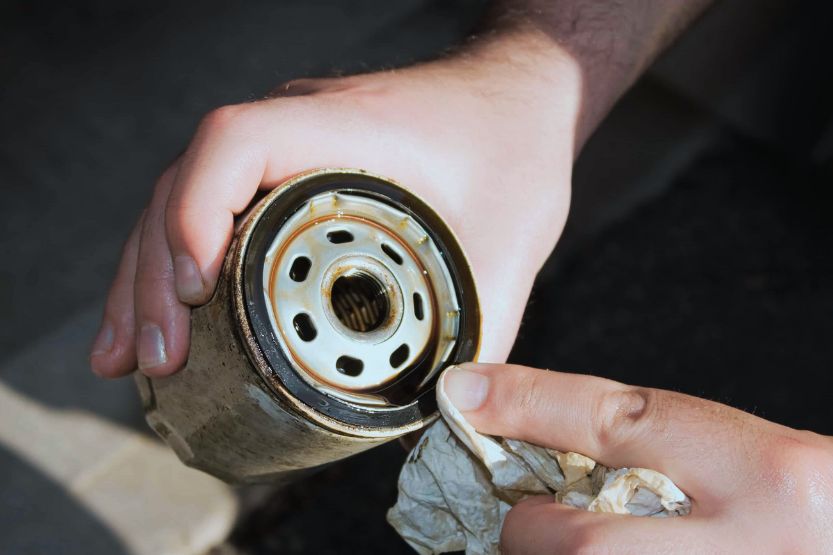
Mentioned earlier are some of the worst things that can happen to your car when you rev the engine. Here is a list of the other things that might happen to your car’s engine. Most of these issues might be repairable, but they will still cost a lot of money:
1. Loss of Compression
When you constantly rev your engine, the first components that would most likely wear down are the piston rings.
The piston rings provide a good seal between the piston and the inner sides of the cylinder. If damaged, air and oil can leak into the combustion chamber, causing the engine to misfire.
2. Damaged Oil Seals
There are two oil seals in the engine – one at the front and another at the back. You can find them at both ends of the crankshaft. What these seals do is keep the engine oil inside the engine. When either one of these seals breaks, you will be leaking oil at a rapid rate.
When you run your engine with a low oil level, it will cause some severe damage later. Replacing either one of these oil seals can be pretty expensive because they are hard to reach. Typically, the shop will need to unmount your car’s engine to replace the seals.
3. Damaged Oil Pan Gasket
Another component that is prone to damage due to over-revving your engine is the oil pan gasket. Revving the engine can cause a lot of back pressure in the engine. It will reach the oil pan eventually. If the oil pan gasket breaks, your engine will run out of engine oil in no time.
4. Burnt Valves
The fuel injection valves may also fail due to revving the engine. This happens when revving the engine and staying in the red zone for too long.
What if one valve burns out and gets stuck in its position? This will cause at least one of the cylinders to misfire, meaning your car will significantly lose power.
Again, is revving your car bad? It’s cool to rev your car once in a while. But revving your vehicle isn’t good for the engine. Specifically, it can cause damage and wear and tear. Plus, you’re also wasting gas, and the act isn’t environmental-friendly.
When Is It Okay to Rev the Engine?
Does revving your car damage it? Are there even times when revving the engine is safe or necessary? There are certain instances when it is okay to rev the engine. However, some terms need to be met first.
For instance, for the BMW M3, when you start the engine, you may find some orange bars on the tachometer. This means that the engine is still cold.
The bars over the tachometer indicate the allowable RPMs of the engine. Once the bars disappear, you can confidently push the engine to the limits.
Unfortunately, most cars do not have this feature, so trust your gut when you think you’re going too far.
Why Do Drivers Rev Their Car?
You probably remember when your dad or grandpa would rev their car’s engine before turning off the ignition. Why did they do this?
As it turns out, they did this to prevent leaving any unburned fuel in the cylinders and engine’s carburetor. They believe this would make it easier to start the car up the following morning.
These days, almost all modern cars no longer have carburetors. What they have instead are electronic fuel injection systems. This means you are revving your vehicle for no justifiable reason. Also, it is wrong to rev engines with carburetors.
All naturally-aspirated engines have fuel pumps, and they work while you are starting the car. This means no need to leave fuel in the carb or cylinders.
5 Driving Habits That Might Be Damaging Your Car

Revving the engine is not the only bad habit drivers have that damages their cars. Here is a short list of the bad driving habits that you might be guilty of as well:
1. Not Using the Parking Brake When Needed
Most people think that simply putting the shifter in the park is enough, but that is not the case. What if you do not use the parking brake even when the car is on level ground? Then you will put the car’s entire weight on the parking pawl, a small piece of metal in the transmission.
The parking pawl is the same size and thickness as your finger. It will eventually wear out and break if you always rely on it to keep your car parked still.
If you also use the parking brake, it will share the load with the parking pawl. This can make your transmission last much longer. Also, you can better keep your car from moving by using two different brakes.
2. Maintaining an Almost Empty Gas Tank
Sometimes, the best we can do is put just $10 at a time in the gas tank. However, it would be better to pay more to prevent later expensive repairs.
Your car’s fuel pump keeps cool by submerging under the fuel in the tank. If you constantly run a low gas tank, it may increase your risk of needing a fuel pump replacement.
3. Sudden Shifting from Reverse to Drive
So, you’re backing out of your parking slot. You discover the coast is clear, so you immediately flick the shifter to drive and step on the gas. Do you do this? If yes, then you need to stop.
Suddenly shifting from reverse to drive, especially when the car is still moving backward, will ruin the transmission. The damage is so much that you might need to replace it entirely.
Rather than still making this bad driving habit, you need to stop. When you are backing out, step on your brakes gradually. Wait for your car to come to a complete stop before shifting to drive. When backing out, waiting a few more seconds can save you from later expensive repairs.
4. Hard Acceleration
If you have a high-performance vehicle, you are probably constantly getting the urge to floor the accelerator on the highway. You may have often indulged yourself and slammed on the brakes to stop immediately.
Here’s the problem. Hard acceleration uses up a lot of gas and places a lot of stress on your car’s transmission. In addition, making full-force stops causes your brake pads and rotors to heat up rapidly. This also creates a lot of wear and tear on the said components.
Stop driving with a lead foot. You are not doing your car any favors by doing so.
5. Abusing Your Clutch
Some stick shift drivers think they are the best in the world, but many have bad driving habits. One example is abusing the clutch. Imagine you just arrived at a stop light.
However, if you depress the clutch instead of putting the shifter on neutral and stepping on the brakes, You then wait for the light to turn green.
This is a bad idea. Keeping the clutch depressed will cause the surfaces of the clutch plates to scrape against each other. This wears down their linings much faster. This bad habit can also cause serious harm to the release arm, release bearing, and pressure plate.
If you want to minimize the frequency of visits to the mechanic’s garage annually, eliminate all these bad habits immediately.
Frequently Asked Questions (FAQs)
Is Revving a Warm Engine Bad?
If the engine is already at the optimum operating temperature, you can rev your engine without any problem. However, keep an eye on your tachometer (if you have one) and keep the needle from redlining.
The red zone is when you are putting a lot of stress on the engine. This can put it dangerously close to failure.
Will Revving the Car Make It Warm Up Faster?
Technically, yes. Revving the engine will warm it up faster. Note, though, that it is mainly due to the metal components scraping against each other because of a lack of lubrication.
Revving a cold engine will not give the engine oil enough time to circulate. This means you are pushing the engine without proper lubrication. It can also result in more than usual wear and tear.
Should You Rev Your Engine Before Turning It Off?
No. In the first place, older people used to do it because their cars had carburetors. Modern cars all have electric fuel injection. They used to rev the engines to leave a bit of fuel in the vehicle.
However, now that you do not have a carb, this is no longer a good reason. What you are doing is flooding the cylinders, and this will only damage your engine.
In Closing – Is Revving Your Car Bad?
Revving the engine may sound cool but what you are doing is making your engine more prone to irreparable damage. When you rev the engine for no reason at all, you are causing significant damage. It could be wasting a lot of gas and pumping toxic exhaust fumes into the atmosphere.
Are there any good reasons for revving the engine of your car? There is no good reason for revving your vehicle. So, you should stop this driving habit.
Sure, hearing your engine roar may sound kind of cool. However, do it too often, and the next sound you will hear is your wallet crying in pain.



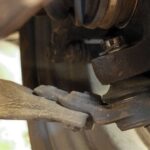
![Bad Alternator Vs Bad Battery [How to Tell] bad-alternator-vs-bad-battery](https://roadsumo.com/wp-content/uploads/2022/02/bad-alternator-vs-bad-battery-150x150.jpg)
